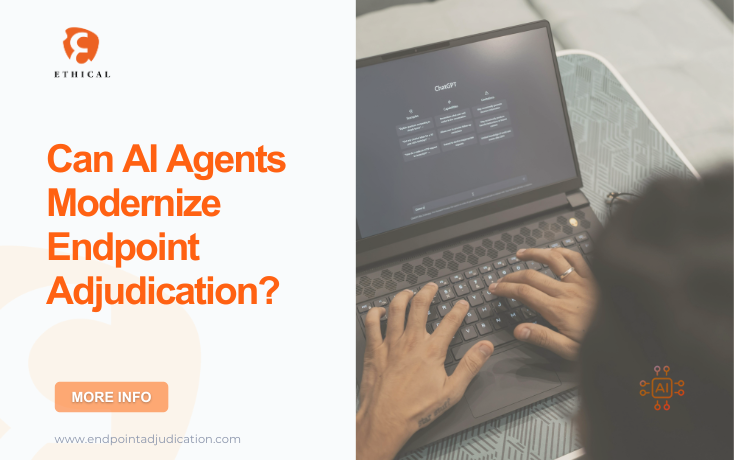As clinical trials become more complex, pressure on human resources continues to grow. Could an AI agent manage the adjudication process with sufficient speed, balance, and precision? This post revisits the key roles in adjudication and explores how AI could support, or even assume, them. Discover how AI agents could transform adjudication operations while reducing workload and accelerating timelines.
Clinical endpoint adjudication is a cornerstone of clinical trial integrity, but the process is becoming increasingly burdensome. As trials grow in complexity and the availability and cost of skilled human resources rise, sponsors are looking for innovative solutions to maintain quality while improving scalability. Artificial Intelligence (AI) agents offer a promising opportunity to support and enhance adjudication processes by assuming defined, rules-based roles in the workflow.
What Are AI Agents, Really?
AI agents are software programs that can interact with their environment, process data, make decisions, and take action toward a defined goal. Unlike traditional algorithms, AI agents operate with a degree of autonomy, enabling them to perform structured tasks without continuous human input.
Anatomy of an Endpoint Adjudication Platform
Endpoint adjudication platforms manage a structured process: initiating cases, collecting and assembling documents, presenting review packages, collecting expert assessments, and archiving results. Roles typically include Site Personnel, Coordinators, Adjudicators, and Chairpersons. This structure raises an important question: which roles could be supported or augmented by AI agents to improve efficiency?
Role-by-Role Evaluation of AI Potential
-
Site Personnel: Limited AI Potential
These individuals gather and submit clinical data, including physical records and device outputs. Because their role involves physical access and direct site interaction, it is less amenable to automation. -
Adjudicators & Chairperson: AI as Assistant
Adjudicators are medical experts who review complex cases. While full replacement by AI is neither feasible nor advisable, AI agents can assist by verifying data completeness, identifying missing information, highlighting discrepancies, or summarizing prior decisions to speed review. For Chairpersons, agents can help with administrative tasks e.g. compare conflicting assessments or prepare summaries for sponsor meetings. -
Coordinator: Prime Role for AI Automation
This is where AI agents can bring the most value. Coordinators manage the adjudication process, monitor case status, balance reviewer workload, and trigger tie-breaks or resolution meetings. These responsibilities are largely rule-based and time-sensitive, making them ideal for a goal-based AI agent.
How Goal-Based AI Agents Work
Goal-based agents are designed to evaluate their environment, define a desired outcome, and choose the most efficient path to reach that goal. For example, when a new clinical endpoint is recorded in the EDC system, an AI agent could:
- Determine whether the event needs adjudication based on charter rules
- Retrieve supporting documentation
- Notify Site Personnel of missing data
- Assign cases to available adjudicators, balancing workload
- Trigger follow-up if reviews are delayed or conflicting
These agents rely on several components:
- Perception Module: Gathers input from systems like EDC and adjudication platforms
- Knowledge Base: Encodes charter rules and platform logic
- Decision-Making & Planning Modules: Select actions to meet the goal efficiently
- Execution Module: Initiates and monitors communication, task updates, and outcomes
Why AI Agents Matter for Clinical Development
Using AI agents in endpoint adjudication can improve process speed, reduce reliance on scarce human resources, and enhance operational transparency. Coordinators can be scaled through automation, and experts can be better supported by intelligent assistants.
Crucially, these agents operate within validated platforms and under strict rule-based governance. Human oversight remains central of course, especially for medical judgment.
A Note on Confidentiality
AI agents designed for clinical applications must operate under the highest standards of data privacy and security. Protecting patient and sponsor confidentiality is not just a design feature, it's a prerequisite for deployment in all clinical trial systems. AI agents for clinical endpoint adjudication should therefore be configured to access only LLMs and other systems that secure sponsor proprietary information.
Conclusion
AI agents are not about replacing human expertise, but scaling and supporting it. In endpoint adjudication, the Coordinator role presents a clear opportunity for goal-based AI agents. By leveraging AI agents, sponsors can meet the demands of modern trials with greater efficiency and confidence.
If you're exploring ways to optimize adjudication operations, the Ethical team is here to help. We bring deep expertise in AI-enabled workflows and purpose-built platforms. Reach out to us through the form below to learn how an AI agent can be tailored to your adjudication needs.




